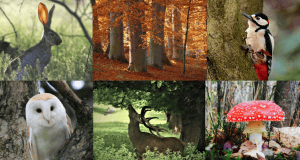
- Over the last few years an orchard containing over 200 fruit trees has been planted.
- The orchard is home to Incredible Eggs ducks, which have the job of keeping the pests down – a great example of a natural ‘old-school’ symbiotic farming method.
- A well established native hedgerow surrounds the farm, providing an extensive habitat and food source for wildlife. Research by the GWCT (Game and Wildlife Conservation Trust) has shown that hedgerows are one of the most important features for farmland wildlife providing shelter, breeding sites and food resources for the majority of our farmland wildlife including birds, mammals, invertebrates and plants.
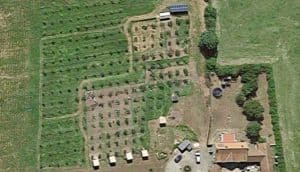
Aerial view of the newly planted orchard, taken several years ago – the trees are the rows of dots!
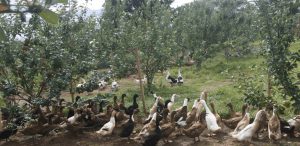
The orchard today, also home to Incredible Eggs ducks
- 3 small orchards have been created over the last decade containing over 170 trees and these are being added to. The trees were sourced from the East of England Apples and Orchards Project (EEAOP), a not-for-profit company which is working to ensure a future for local orchard fruits and orchards. These historic, local varieties and their orchard habitat need to be preserved for their local significance, genetic diversity, as local food sources and for their landscape and wildlife value.
- 25 hazel trees have also been planted, which produce cobnuts. Large chicken runs have been built around these, providing areas of shade, shelter and a varied terrain to the Incredible Eggs chickens who live there.
- 3 bee hives are maintained, to assist pollination.
- A native hedgerow has been planted around the entire perimeter of an 8 acre field, creating an extensive habitat and food source for wildlife – as well as helping to contain the herd of goats who live within!
- Land has been planted with native trees and fenced off from livestock as rewilded conservation areas.
- In 2020 the East branch will be working with the Woodland Trust and local community to assist with the planting of 100 native trees in the area.
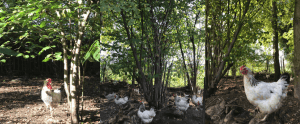
Young hazel trees
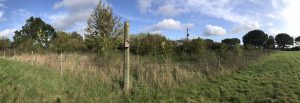 One of several rewilded conservation areas, planted with native trees and reserved exclusively for wildlife.
One of several rewilded conservation areas, planted with native trees and reserved exclusively for wildlife.
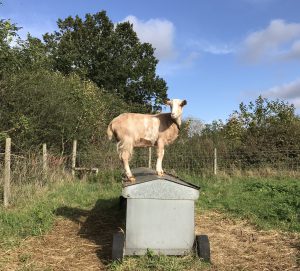 Absolutely nothing to do with this blog – he just really wanted his photo taken.
Absolutely nothing to do with this blog – he just really wanted his photo taken.
- This farm has been working with the Woodland Trust during the last year to plan the adding of new trees and hedgerows to the land, which will consist of the following: 25 silver birches, 50 wild cherries, 75 dogwoods, 75 wild privets, 175 hazels, 175 field maples, 150 blackthorns and 825 hawthorns, to be precise!
- It has also been allocated 5 trees from the Queens Commonwealth Canopy project and these will be planted soon.
- A similar amount of planting is scheduled to take place in 2020/21
Pics to follow once planting has commenced!
*****
- This branch farm protects and maintains 6 acres of mature mixed woodland, containing ash, oak, elm, willow and elder trees.
- The wood contains a pond teeming with wildlife, most notable of which are the wide variety of beautiful dragonflies and damselflies.
- This branch also farms a 40 acre crop of Miscanthus, which is grown organically without using herbicides or pesticides.
- Rather than creating one enormous field, the crop is spread over 6 small adjoining fields, with wide grass margins and mature hedgerows separating each. This is an environmentally friendly method of farming, which provides a network of wildlife corridors.
- Miscanthas is not a tree, but a giant grass which grows to heights of about 12ft. Although not native to this country, it is a non-invasive specie known for it’s rapid CO2 absorption, and is a now a favourite choice for biofuel – a renewable substitute for fossil fuel. It is also home to an abundance of wildlife, such as the many deer which are often seen peeping out.
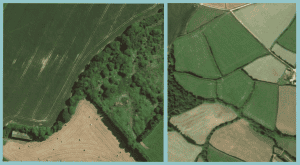
Aerial view showing part of the woodland and the 6 Miscanthas fields (right hand pic, dark green), with a network of trees and hedgerows running between them.
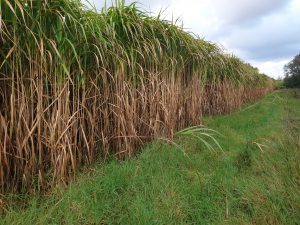
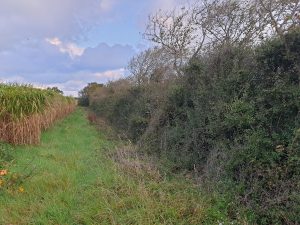
Miscanthas grass and a ‘wildlife corridor’ of wide grass margins and native hedgerows at our South West branch.
*****
The great thing is that we can all help to increase the number of trees on the planet if we so choose, even if planting them ourselves is not possible. There are now plenty of reputable third party providers who will plant on behalf of others, such as the fantastic ‘Just One Tree’.This is a not-for-profit social enterprise who guarantee to plant at least one tree for every £1 they receive and we are delighted to have recently officially partnered with them.
In addition to our own tree planting schedule here in the UK, Incredible Eggs is now able to finance the planting of trees further afield through this partnership, which is hugely exciting – updates to follow!
We’d like to say an enormous thank you to all the wonderful schools, nurseries and care homes who have chosen to book with Incredible Eggs. It is your continued support which has made initiatives such as this possible, so thank you – from us, our wildlife and our planet.

Further reading:
Free trees for schools and communities – Woodland Trust
Grow a tree for wildlife – RSPB
Climate change: Trees ‘most effective solution’ for warming – BBC News, July 2019
